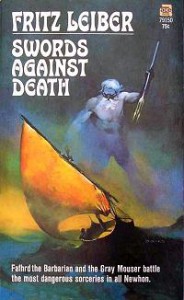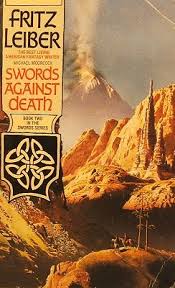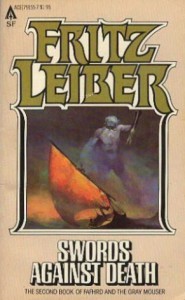Swords Against Death Re-Read: “The Sunken Land”
 Bill Ward and I are re-reading a book from Fritz Leiber’s famous Lankhmar series, Swords Against Death. We hope you’ll pick up a copy and join us. This week we tackled the sixth tale in the volume, “The Sunken Land.”
Bill Ward and I are re-reading a book from Fritz Leiber’s famous Lankhmar series, Swords Against Death. We hope you’ll pick up a copy and join us. This week we tackled the sixth tale in the volume, “The Sunken Land.”
 Howard: This is a grand tale, told with economy. Heck, that sentence could practically stand as my review, but I’ll get more specific. Like “The Howling Tower,” this tales feels as if it were written to a definite word count limit, but this time there’s exactly enough room to say what needs to be said. As a matter of fact, it’s just about perfect. Last week we saw a tale that was mostly about the Mouser on his own — this week we read one that was mostly Fafhrd on his own. And what a story! Opening with that fantastic scene where Fafhrd shouts that he was born with luck as a twin, it blazes forward and never looks back.
Howard: This is a grand tale, told with economy. Heck, that sentence could practically stand as my review, but I’ll get more specific. Like “The Howling Tower,” this tales feels as if it were written to a definite word count limit, but this time there’s exactly enough room to say what needs to be said. As a matter of fact, it’s just about perfect. Last week we saw a tale that was mostly about the Mouser on his own — this week we read one that was mostly Fafhrd on his own. And what a story! Opening with that fantastic scene where Fafhrd shouts that he was born with luck as a twin, it blazes forward and never looks back.
Bill: That articulates what I was thinking, that it feels like a similar kind of story to last week’s, a weird tale. Even though the central character changes, notice both times it’s the Mouser who has to go get his big friend, that twin of luck, out of trouble again.
Howard: Good point. I’m trying to recall if that’s a regular aspect of their relation or not. The prose swept me along so easily that I had to force myself to stop and pay attention to the scaffolding. Studying this piece in detail is like taking an entire course on writing. How about the wonderful opening, and then the way description is worked in as the story moves along, as if Leiber’s a skilled cameraman? How many modern writers can do that? (For that matter, how many writers of Leiber’s time could do that?) Then there’s the “coincidence” of the ring and the northerner’s long ship that turns out not to be; the Mingol who provides just enough information and then gets killed when his purpose in the story has been served, his death serving to emphasize ANOTHER purpose. How about all the excellent mood setting descriptions? And how about the loyal steersman, ready to stand up for Fafhrd more than once because they fought the waves together? These are all nice little touches that add to the story’s success — although none of them would have carried the tale if the tale itself hadn’t been rock solid.
 Bill: Leiber really is something, isn’t he? I want to go back and read certain lines sometimes, but I’m usually swept up, as you say.
Bill: Leiber really is something, isn’t he? I want to go back and read certain lines sometimes, but I’m usually swept up, as you say.
Howard: Let’s not forget the horror, a sometimes overlooked ingredient in sword-and-sorcery. As you mentioned last week, Leiber’s really skilled with horror and descriptions of the supernatural. I suppose in a lot of ways this short story is far more horror than a sword-and-sorcery romp. I mean, Fafhrd does wield his sword, but not against the THINGS. That would have been folly.
Do you remember how I worried how I’d feel about this book, coming back to it after twenty-five years? Well, I applaud my taste as a young man. This collection is chock full of great writing. It’s no wonder I fell in love with these stories and that they had such a lasting impact upon me.
Bill: Good taste indeed. There’s a reason people still love these stories after so many decades. The description of what horrors awaited the crew at the end were also drawn with the same economy and subtlety as the weird menaces from last week. The sea descriptions and the boat business — all of it, really — were written with a very confident and knowing hand. There is a paragraph at the end that covers Fafhrd’s flight that is a jewel of concise, fast-paced, colorful writing.
Also, on an unrelated note, it occurred to me while reading this story that it was the direct inspiration for a story I wrote years ago, but I had utterly forgotten that until reading it again this time around.
Howard: I’m not surprised! There are so many good ideas and approaches in here. I’ve tried to start tales with dialogue that launch as well as this, but I’ve yet to manage it.
On another note, I’ve always believed that the painted image of the ship used on my favorite version of the cover (by Jeff Jones, with the sea god on the right hand side) was an image from this particular story. The ship lacks a pontoon, but perhaps its just not noticeable because it’s under a wave. (On the other hand, supposedly Fafhrd rigged the ship with a triangular sail, and it’s not completely clear to me what the sail’s shape is.)
Anyway, next week we’re looking at “The Seven Black Priests.” Hope to see you here!
15 Comments